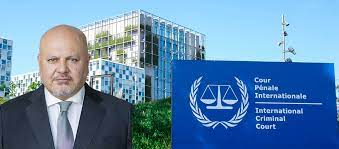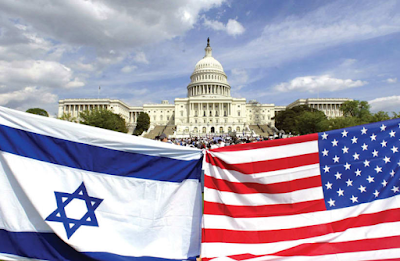There is a fundamental question that I would very much like
to have answered, what is the rules-based international order? Why such a
question you might ask, because the International Criminal Court has finally
decided to issue warrants for the arrest of leaders of both Israel and Hamas
over the humanitarian crisis going on in Gaza; this comes on the heels of an International
Court of Justice ruling that a genocide was indeed taking place in that part of
the world. This is but the second incident
in which the ICC has acted in this manner recently, it issued similar warrants
for the arrest of Russian President Vladimir Putin for the ongoing situation in
Ukraine. That was not the first time that a European leader had been charged
with war crimes by an international tribunal, this also happened at the
Nuremburg trials that took place after World War II. Such incidents however are
exception to the rule as international criminal law has a tendency to target
leaders from the Global South such as Bashar Al-Assad of Syria or Omar
Al-Bashir of Sudan, leading to criticisms of the courts being biased.
And speaking of criticism, it did not take long for Israel
and their US allies challenge this decision on account of bias. This charge
however has no merit whatsoever as the ICC warrants have been equally applied
to both Israeli and Hamas leaders. This application of the rules in an
equitable manner has not satisfied the critics like US President Joe Biden and
his Secretary of State Anthony Blinken who have made the argument that it is
“wrong” to apply equivalence to the actions of Israel and those of Hamas. The
logic behind such an argument goes that because Israel is the “only democracy”
in the Middle East then treating it as a pariah state is wrong. I however would
argue that since Israel claims to be a democracy then it should be judged by
the standard of what is expected of a democracy and when it falls short, it
should be held accountable like any other nation. Democracy is inherently
linked with the rule of law, yet the argument put forward by Israel and its
allies is that the Zionist state should not be subject to the same rules as its
adversaries.
On the matter of adversaries, I would like to draw a sharp
contrast between how US reacted to the ICC’s warrants against Netanyahu as
opposed to the one issued against Putin. The United States in the past has a
tendency to be very supportive of international court rulings when applied to
their enemies such as the Russians, however as soon as Israel is the one placed
on the microscope then all of a sudden the legitimacy and even the integrity of
the court is called into question. One of the most egregious examples of this
comes directly from the Netanyahu himself who called the court anti-Semitic for
daring to hold him accountable. This is hardly the first time he has made such
a claim, using that same rhetoric to refer to South Africa when it brought its
genocide case before the ICC. He also said something similar regarding
protesters around the world calling for justice for the Palestinian people. In fact,
one can see it almost as a pattern of the Israeli Prime Minister where every
critic is called a neo-Nazi sympathizer. How can Israel plausibly refer to
itself as a democracy when it uses such ugly language to smear anyone that
dares criticize it?
Israel is not alone in this however as the United States has
also taken a similar stance to refer to critics of Israel and its ongoing
offensive against the people of Gaza. A week before the warrants were issued, a
group of US Republican senators issued threats to staff members of the ICC wishing
to impose heavy penalties should they follow through on issuing the warrants.
This act of bullying would be clearly unacceptable in other context and quite
frankly it is rather disturbing that the same US that commonly refers to its
enemies like Putin and Assad as thugs, now has some of its most senior congress
members openly and blatantly intimidating court officials and staff in the
exercise of their judicial functions.
If all of this was
not already bad enough, some of the most hardline Zionists in the US have even
advocated for the US to invoke The Hague Invasion Act (HIA) to deal with the
ICC should they attempt to bring Netanyahu or other Israeli leaders to justice.
The HIA claims to give the US Armed Forces the “right” to take military action
to rescue any US personnel who being held by the ICC. This act has never
actually been exercised but the very fact that it even exists on the books is
telling as such an action would require the US to invade the sovereign
territory of the Kingdom of the Netherlands, a democracy and a NATO ally, an
act which clear violates the North Atlantic Charter. The fact that some in the
US would advocate using this method to violate international law to defend
persons who are not even US citizens sends a clear message that they see
themselves as being above the rules based international order.
Another talking point that demonstrates the hypocrisy of the
US and Israel is the argument regarding jurisdiction. According to the US and
Israel, the ICC has no jurisdiction because Israel is not a signatory of the
Rome Statute. This argument falls flat for two reasons, first of all, the Rome
Statute in Article 13 states that once ONE of the affected party is a signatory
to the statute then the ICC does have jurisdiction and in this case Palestine
is a signatory to the statute therefore its jurisdiction in this matter is
perfectly legal. Secondly, the same US which claims that Israel is exempt from
ICC rules had no problem supporting the ICC warrant against Putin for the
Ukraine War although in that case neither Russia nor Ukraine were signatories
of the Rome Statute which means that the ICC genuinely had no jurisdiction
there. US stance on the ICC’s case
against Netanyahu is rooted in its decision to refuse to recognize Palestinian
statehood which in their view makes Palestine’s signature of the statute
illegitimate. However, it must be pointed out that the US is not the arbiter of
international law and in an environment where more and more countries are
increasingly recognizing the legitimacy of a Palestinian state, its competence
to sign the Rome Statute is therefore perfectly legal.
In a democratic world order, all are meant to be equal, but
clearly some are more equal than others, which goes against the very spirit of
a rules-based international order in the first place. Idea that some nations
can pick and choose when to apply rules, how to apply rules and who the rules apply
to are all clear signs of a broken system. There can be no justice in the
world, so long as law is not respected by all, otherwise what we end up with as
a two-tiered hypocritical system where the rules can “apply to thee but not to
me” .







